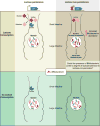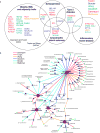The Relationship Between the Human Genome and Microbiome Comes into View
- PMID: 28934590
- PMCID: PMC5744868
- DOI: 10.1146/annurev-genet-110711-155532
The Relationship Between the Human Genome and Microbiome Comes into View
Abstract
The body's microbiome, composed of microbial cells that number in the trillions, is involved in human health and disease in ways that are just starting to emerge. The microbiome is assembled at birth, develops with its host, and is greatly influenced by environmental factors such as diet and other exposures. Recently, a role for human genetic variation has emerged as also influential in accounting for interpersonal differences in microbiomes. Thus, human genes may influence health directly or by promoting a beneficial microbiome. Studies of the heritability of gut microbiotas reveal a subset of microbes whose abundances are partly genetically determined by the host. However, the use of genome-wide association studies (GWASs) to identify human genetic variants associated with microbiome phenotypes has proven challenging. Studies to date are small by GWAS standards, and cross-study comparisons are hampered by differences in analytical approaches. Nevertheless, associations between microbes or microbial genes and human genes have emerged that are consistent between human populations. Most notably, higher levels of beneficial gut bacteria called Bifidobacteria are associated with the human lactase nonpersister genotype, which typically confers lactose intolerance, in several different human populations. It is time for the microbiome to be incorporated into studies that quantify interactions among genotype, environment, and the microbiome in order to predict human disease susceptibility.
Keywords: genome-wide association studies; heritability; human studies; microbiome; microbiota composition.
Figures



References
-
- Bonder MJ, Kurilshikov A, Tigchelaar EF, Mujagic Z, Imhann F, et al. The effect of host genetics on the gut microbiome. Nat Genet. 2016;48(11):1407–12. - PubMed
Publication types
MeSH terms
Grants and funding
LinkOut - more resources
Full Text Sources
Other Literature Sources
Medical

